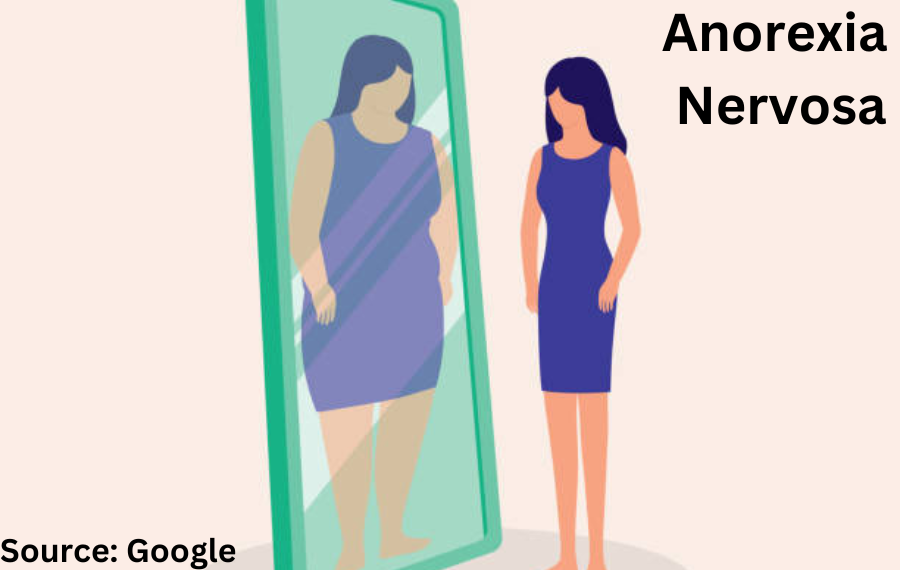Anorexia Nervosa, a serious mental health condition, revolves around an individual’s distorted perception of their body weight and shape. This disorder often leads to obsessive efforts to control weight by restricting food intake. The term “Anorexia Nervosa” itself reflects a blend of Greek and Latin roots, symbolizing a loss of appetite due to nervousness.
Symptoms and Diagnostic Criteria
Recognizing Anorexia Nervosa involves observing a multitude of behavioral, emotional, and physical symptoms. Individuals may exhibit relentless efforts to maintain an extremely low body weight, fear of gaining weight, and a distorted body image. Diagnostic manuals, such as the DSM-5, provide specific criteria, including weight loss, avoidance of maintaining a healthy weight, and a relentless pursuit of thinness.
Factors Influencing Anorexia Nervosa
The development of Anorexia Nervosa is complex and multifaceted. Genetic, environmental, societal, and psychological factors play crucial roles. Genetics contribute significantly, with a higher likelihood of developing the disorder if a family member has had it. Additionally, environmental factors such as cultural norms glorifying thinness and societal pressures can significantly impact its onset.
Impact on Physical and Mental Health
The consequences of Anorexia Nervosa extend beyond physical health. Severe malnutrition leads to a range of physical complications, including but not limited to cardiovascular issues, gastrointestinal problems, and a weakened immune system. Furthermore, the psychological toll encompasses anxiety, depression, and distorted cognition related to body image.
Treatment and Recovery
Recovery from Anorexia Nervosa involves a comprehensive approach addressing both physical and mental health. Treatment typically involves a combination of medical care, nutritional rehabilitation, psychotherapy, and sometimes medication. It’s crucial to involve a multidisciplinary team to provide holistic support for the individual’s recovery journey.
The Prevalence of Anorexia Nervosa
Anorexia nervosa is not as rare as one might think. This condition primarily affects young individuals, often during their adolescent years. With anorexia’s prevalence on the rise, it is crucial to explore the contributing factors and recognize the signs and symptoms early on.
Causes of Anorexia Nervosa
Understanding the root causes of anorexia nervosa is essential in addressing and combating this disorder effectively. While there is no single cause, several factors can contribute to the development of anorexia, including genetics, societal pressures, and psychological factors. This section will delve into these causes in detail.
Recognizing the Symptoms
Early detection is vital when dealing with anorexia nervosa. Identifying the symptoms can be challenging, as those struggling with the disorder often go to great lengths to hide their condition. It is crucial to recognize these signs to offer timely intervention and support.
Psychological and Emotional Impact
Eating disorders not only takes a toll on an individual’s physical health but also has profound psychological and emotional consequences. This section will explore the mental and emotional aspects of anorexia, highlighting the importance of addressing both the physical and psychological aspects of this condition.
Physical Health Consequences
The physical health implications of anorexia nervosa can be severe and life-threatening. Malnutrition, heart problems, and gastrointestinal issues are just a few of the many challenges individuals with anorexia may face. Understanding these consequences is crucial for both those affected and their caregivers.
Treatment Options for Anorexia Nervosa
Recovery from anorexia nervosa is a complex and challenging journey. Effective treatment approaches often involve a multidisciplinary team of professionals, including therapists, dietitians, and medical doctors. This section will delve into the various treatment options available and their efficacy in helping individuals overcome anorexia.
Cognitive-Behavioral Therapy (CBT)
Cognitive-behavioral therapy (CBT) is one of the most commonly used approaches in treating anorexia nervosa. It focuses on addressing the distorted thought patterns and behaviors that underlie the disorder, helping individuals develop healthier relationships with food and body image.
Family-Based Treatment (FBT)
Family-based treatment, also known as the Maudsley method, is a highly effective approach for adolescents with anorexia. This therapy involves the entire family in the recovery process, providing essential support for the affected individual.
Medication
In some cases, medication may be prescribed to manage co-occurring conditions such as anxiety and depression. Understanding the role of medication in anorexia treatment is critical for a holistic approach to recovery.
Nutritional Rehabilitation
Nutritional rehabilitation is a cornerstone of anorexia treatment. Restoring a healthy weight and nutritional balance is a primary goal, and it often involves working closely with a registered dietitian to develop a meal plan tailored to the individual’s needs.
Support and Recovery
Recovery from anorexia nervosa is an ongoing process that requires consistent support and commitment. This section discusses the importance of support networks, relapse prevention, and maintaining a healthy, balanced lifestyle.
Raising Awareness and Breaking Stigma
One of the most significant barriers to effectively addressing anorexia nervosa is the pervasive stigma associated with it. This section highlights the importance of education, awareness, and compassion in dispelling misconceptions and providing a supportive environment for those affected by the disorder.
Read more:

FAQs
Why is it called anorexia?
The term “anorexia” originates from the Greek words “an” (without) and “orexis” (appetite). It signifies a condition where individuals intentionally restrict their food intake, leading to severe weight loss and potential health complications.
What is anorexia nervosa short?
Anorexia nervosa is often referred to simply as “anorexia.” It is an eating disorder characterized by extreme weight loss, an intense fear of gaining weight, distorted body image, and obsessive behaviors related to food and body size.
What does nervosa stand for?
“Nervosa” in anorexia nervosa refers to the psychological component of the disorder. It implies the involvement of emotional and mental factors, emphasizing the complex interplay between distorted thoughts, feelings, and behaviors related to food and body image.
What is the treatment of anorexia nervosa?
Treatment for anorexia nervosa typically involves a multidisciplinary approach. It includes medical care for physical health, psychotherapy to address underlying emotional issues, nutritional counseling, and family support. In severe cases, hospitalization may be necessary to manage complications and ensure a safe recovery.
Conclusion
Anorexia Nervosa is a complex and challenging condition that necessitates a multidimensional approach for treatment and recovery. Understanding the symptoms, underlying factors, and supportive strategies is vital in effectively addressing this disorder.
In summary, providing comprehensive care and support for individuals dealing with Anorexia is essential in aiding their journey towards recovery and improved mental and physical health. If you or someone you know is battling this condition, seeking professional help and building a strong support system is the first step towards healing and well-being.
